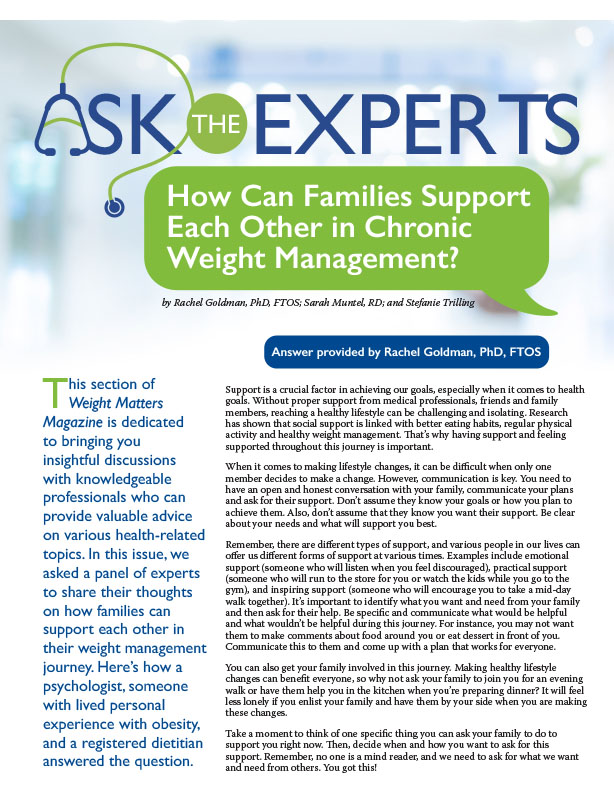Ask the Experts: How Can Families Support Each Other in Chronic Weight Management?


by Rachel Goldman, PhD, FTOS; Sarah Muntel, RD; and Stefanie Trilling
Winter 2024
This section of Weight Matters Magazine is dedicated to bringing you insightful discussions with knowledgeable professionals who can provide valuable advice on various health-related topics. In this issue, we asked a panel of experts to share their thoughts on how families can support each other in their weight management journey. Here’s how a psychologist, someone with lived personal experience with obesity, and a registered dietitian answered the question.
Answer provided by Rachel Goldman, PhD, FTOS
Support is a crucial factor in achieving our goals, especially when it comes to health goals. Without proper support from medical professionals, friends, and family members, reaching a healthy lifestyle can be challenging and isolating. Research has shown that social support is linked with better eating habits, regular physical activity, and healthy weight management. That’s why having support and feeling supported throughout this journey is important.
When it comes to making lifestyle changes, it can be difficult when only one member decides to make a change. However, communication is key. You need to have an open and honest conversation with your family, communicate your plans, and ask for their support. Don’t assume they know your goals or how you plan to achieve them. Also, don’t assume that they know you want their support. Be clear about your needs and what will support you best.
Remember, there are different types of support, and various people in our lives can offer us different forms of support at various times. Examples include emotional support (someone who will listen when you feel discouraged), practical support (someone who will run to the store for you or watch the kids while you go to the gym), and inspiring support (someone who will encourage you to take a mid-day walk together). It’s important to identify what you want and need from your family and then ask for their help. Be specific and communicate what would be helpful and what wouldn’t be helpful during this journey. For instance, you may not want them to make comments about food around you or eat dessert in front of you. Communicate this to them and come up with a plan that works for everyone.
You can also get your family involved in this journey. Making healthy lifestyle changes can benefit everyone, so why not ask your family to join you for an evening walk or have them help you in the kitchen when you’re preparing dinner? It will feel less lonely if you enlist your family and have them by your side when you are making these changes.
Take a moment to think of one specific thing you can ask your family to do to support you right now. Then, decide when and how you want to ask for this support. Remember, no one is a mind reader, and we need to ask for what we want and need from others. You got this!
Answer provided by Sarah Muntel, RD
Obesity should be recognized and treated as a chronic disease, necessitating lifelong management. When embarking on the journey of weight management, it only makes sense to get support from those closest to you—your family. Given that families spend a great deal of time together and considering the genetic component of obesity, family support is crucial. Approaching weight management as a family can benefit everyone!
So, what does it take to get the support you need?
Communicate
Effective communication is key. Family members must understand the significance of weight management. Are they aware that neglecting weight control increases the risk of developing conditions such as diabetes, hypertension, and sleep apnea? Often, a shared understanding of the “why” makes it easier to work together as a team. Adding small lessons into daily life can help in understanding the complexities of obesity as a disease.
- Teach your kids that adding a vegetable to dinner enhances health by providing essential nutrients and fiber, making it a low-calorie choice for weight management.
- Emphasize that incorporating movement into the day not only improves health but also helps with weight management. A quick 10-minute walk can improve your mood, and an evening bike ride can burn calories.
Plan
Weight management isn’t easy. Coming up with a plan for your family ensures everyone is on the same page. Each family member, regardless of the size of their role, can contribute. Working together as a team can engage all team members.
- Have your school-age kids plan an after-dinner activity to stay active instead of remaining sedentary on the couch. Physical activity plays a significant role in weight management, and a family-oriented activity can be fun!
- Visit the grocery store as a family and allow members to select snacks such as fresh fruits, vegetables, cheese sticks, yogurt, and nuts. Choosing the right healthy foods and having them available can be a triumph! Take it to the next step by using these items to prepare a wholesome meal.
Teamwork
Staying on track is best achieved when family members support each other. Identify the support you need from your family and ask them to pitch in.
- Enlist your children or partner as walking partners. Remind each other when it’s time to be active.
- Ask your family to keep treats out of reach. Often, “out of sight, out of mind” holds true. Store treats and sweets in a cabinet that is hard to access and see.
Remember, managing your weight is a daily commitment. Acknowledge that there will be both ups and downs, but with your family supporting each other, the journey becomes a bit easier.
Answer provided by Stefanie Trilling
Despite my significant weight-loss success thanks to treatment with anti-obesity medication, and a BMI that no longer qualifies as having obesity, I will deal with obesity for the rest of my life. I have obesity whether I weigh 140 pounds, 240 pounds, or anywhere in between — until there’s a cure. For better or worse, I’ve seen the good, the bad, and the ugly as it relates to my chronic weight management in a family in which I’m the only person with obesity. In short, families can support each other in chronic weight management by following three steps:
- Suspending judgment (or at least biting one’s tongue, especially when someone else is biting into food). This means withholding well-meaning (and not-so-well-meaning) comments about a family member’s weight, size, shape, appetite, food or drink choices, obesity medication prescriptions, or decisions not to medically treat their obesity. At certain times in my life, just existing in public—the simple act of being—made me feel as if I were exposing my shame to the whole world. It was even worse when I was buying food or eating. Support your family members on their journey by averting your gaze and turning your scrutiny to something more interesting than whether they lost or gained a few pounds over the holidays.
- Remembering that excess weight is just one side of the obesity coin—your family member is the same person on the inside. Weight is just one part of the whole obesity journey. Marvels of modern medicine, like the anti-obesity medications semaglutide and tirzepatide, have helped people manage their weight and feel better physically. However, scientists have not yet found a way to treat the toll that years of shame and guilt can have on the psyche of a person with obesity. Just because your family member may look different, don’t expect them to feel however you may think a “thin person” or a “happy person” feels overnight … or maybe ever. Weight loss is only the beginning of true change in chronic weight management.
- Understanding that chronic weight management journeys don’t result in a picture-perfect “before” and “after” snapshot. Most importantly, there’s no “before” and “after.” Chronic weight management is not linear, nor does it have an endpoint (unless, of course, some amazing scientist uncovers a cure for obesity). Factors beyond a person’s control—such as medication shortages, illness or injury, changes to health insurance or finances, and stressful life events—may cause your family member to gain weight during their chronic weight management journey. My advice? See Step 1.
The path of chronic weight management is extremely personal, and support will look different in every family. Keep an open mind and let your family member drive the bus on their own journey.
About the Authors:
Rachel Goldman, PhD, FTOS, is a licensed psychologist, speaker and consultant known for her holistic approach to health. Specializing in the mind-body connection, she focuses on areas such as stress reduction, disordered eating behaviors and health behavior change. Dr. Goldman holds the position of Clinical Assistant Professor in the Department of Psychiatry at NYU Grossman School of Medicine and operates a private practice in NYC, where she uses cognitive behavioral therapy to assist in behavioral changes. Prior to starting her private practice, she was the Senior Psychologist at the Center for Obesity and Weight Management at Bellevue Hospital. Her work as a bariatric psychologist was highlighted in the June 2016 APA Monitor on Psychology. Dr. Goldman is frequently featured in the media, with notable appearances such as a recent conversation with Oprah and as a consultant for the film, “The Whale.” She is passionate about helping others make behavior changes that will allow them to live happier and healthier lives.
Sarah Muntel, RD, is a Registered Dietitian with more than 20 years of experience working with surgical and medical weight-loss patients. She is passionate about helping people reach their health and wellness goals. In her free time, Sarah enjoys spending time with her husband and children, watching her children’s activities, and going on walks with friends.
Stefanie Trilling is a legal marketing professional, recovering lawyer/journalist, and full-time anti-obesity medication evangelist. She collects hobbies and lives with her husband, two kids, and a dog in Manhattan.
by Sarah Muntel, RD Spring 2024 Spring has sprung, bringing sunnier and warmer days! For many, this…
Read Articleby Robyn Pashby, PhD Winter 2024 “No one is ever going to date you if you don’t…
Read Articleby Michelle “Shelly” Vicari Winter 2024 Winter has arrived! Don’t allow the chilly and damp weather to…
Read Article









